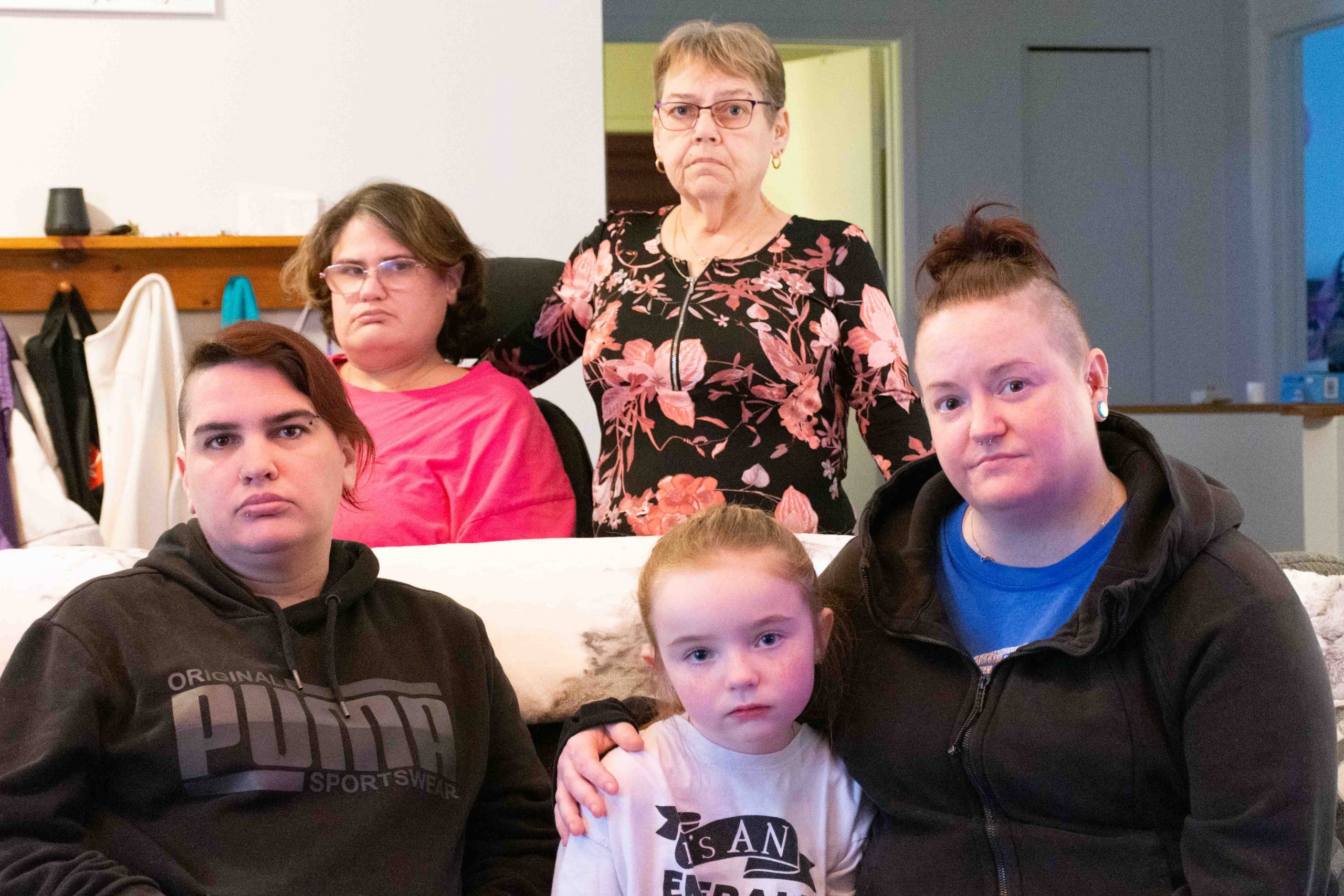WATERLOO – After picking up Penny, a “goldendoodle” puppy, from a Mapleton farm on March 8, parents Jessica and Jamie England and their two young children became smitten by their new four-legged family member.
Three days later, they decided to return for Penny’s sibling, Carley.
But what was supposed to be an exciting March break for the family quickly took a turn for the worse, into a heartbreaking ordeal both emotionally and financially.
Mere days after the puppies were purchased from Mapleton farmer Edgar Martin, Penny and Carley were diagnosed with canine parvovirus, a highly contagious and vaccine-preventable disease with a high mortality rate.
The puppies were later euthanized, at just 10 weeks old.
Now the couple, along with Jessica’s mother, Sandy England, are speaking out about what they believe are rogue puppy mills selling parvovirus-infected animals to unwitting buyers.
Speaking to the Advertiser at his Mapleton farm property, Martin said the animals were “perfectly healthy” when they were purchased by the Englands.
He said puppy litters are “usually vaccinated” before arriving at his farm, and the dogs are tested for parvovirus before being sold.
Unvaccinated puppies, or those without a full set of shots, between 16 weeks and six months old are most susceptible to parvovirus.
Vaccinations should be given at six, eight and 12 week intervals, according to the American Kennel Club, with another dose between 14 and 16 weeks of age.
Though Penny remained healthy four days after being purchased, Carley became sick just a day after arriving at her new home.
The Englands returned from a vet visit with an injection to stave off nausea and advice to keep a close eye on the puppies.
Carley’s health quickly deteriorated and she tested positive for parvovirus.
“Carley was too far gone to the point of no return, so we had no choice but to put our sweet and innocent puppy down to rest,” the Englands wrote in an online message for a GoFundMe campaign addressing the costs incurred from vet visits (the Farley Foundation charity covered the cost of euthanizing Carley).
Two days after Carley was put down, Penny began vomiting and she too tested positive for parvovirus.
“We have decided that we don’t want to keep putting her though this and prolonging the inevitable while she continues to suffer,” the Englands wrote about Penny.
“At least they did not cross that rainbow bridge alone and unloved.”
Carley was euthanized six days after being purchased, and Penny made it 13 days.
“We’re broken,” Jessica said.
“It’s heartbreaking,” Sandy added.
The Waterloo family found advertisements for the goldendoodles posted to Kijiji and messaged a number on the ad, posted by a profile listing the name of “Mark.”
When they arrived at the Line 86 farm for the first time on March 8 to pick up Penny, nothing raised any alarms, nor did a subsequent visit days later to pick up Carley.
The puppies were kept in cribs inside a relatively clean barn.
The Englands paid $380 in cash for each puppy, were given vaccination records, and bags of dog food.
After the puppies became ill, Jessica and Jamie grew suspicious of the veterinary records, and now contend they were inaccurate or falsified.
Despite being told Penny and Carley were from the same litter, their birthdates on their vaccination records were different.
Jessica ran Tejwant Chahal, the name of the veterinarian stamped on the back of the records, through Google and was shocked at the results.
The Brampton-based veterinarian is the focus of multiple allegations, over several years, of issuing vaccination certificates for animals that have later died from vaccine-preventable diseases.
The Advertiser attempted on two occasions to contact Chahal for comment, but was hung up on each time a reporter identified themself.

These two 10-week-old goldendoodle puppies were purchased from a Mapleton Township farm by Waterloo residents, who now contend the animals were supplied by a puppy mill. Both puppies were later euthanized after being diagnosed with parvovirus, a vaccine-preventable disease. Photo submitted
Jessica suggests prospective buyers scour the internet in advance of purchasing a puppy to avoid a similar experience.
“We didn’t do our research,” she admitted.
“There’s no respect for the animals or the people that are buying them,” Sandy said, adding the animals are nothing more than a “commodity to them.”
The Englands have since lodged a complaint against Chahal with the College of Veterinarians of Ontario (CVO), and posted a “buyer-beware” message to social media to alert others to their experience.
CVO executive Kim Huson responded to the Advertiser’s questions about Chahal with a written statement saying all concerns are investigated, but the college is “not able to comment on this case” because case information isn’t “in the public domain” under provincial law.
“However, we can confirm the college has previously investigated complaints and has current investigations in relation to this member’s conduct,” Huson wrote.
The CVO’s registry shows only that the veterinarian works at a private practice in Bramptom called Chahal Veterinary Services, and has an active licence with no conditions or limitations imposed.
Donna Powers, co-founder and president of animal advocacy organization Stop the Mills, has been advocating for animals for around three decades, but in the past five years has focused her efforts on puppy mills.
Based on her research, Power suggested there are at least 400 puppy mills currently operating in southern Ontario – and 40 within Wellington County.
There’s little government oversight, Powers said, and big money can be made by breeders who continually inseminate breeder dogs under “horrendous” conditions until they’re no longer of use and killed off.
She’s advocating to municipalities such as Mapleton for stricter bylaws and enforcement, but in most cases, she runs up against political resistance and disinterest.
“[Dogs are] simply a commodity, and they’re only looking at profit,” she said of the breeders and brokers who conduct their business with seeming impunity.
“They don’t do any testing, there’s no health concerns, there’s no standards of care, there’s no quality of life.”
Powers said such conditions lead to the spread of diseases such as the parvovirus, and the selling of sick animals to consumers who are “completely unaware” they’ll be forking out thousands of dollars to care for and potentially euthanize their new puppy.
Powers claims to have interviewed over 50 people in the past four years who have fallen victim to puppy mills, and she notes a recurring theme is Chahal’s stamps on vaccination records.
But more than the financial cost, Powers said, those like the Englands are losing beloved family pets, all because of lax bylaws and enforcement at the local level and a lack of oversight and enforcement at the provincial level.
Camille Labchuk, a lawyer and executive director of Animal Justice, a national animal law advocacy organization, said the province hasn’t a single law pertaining to dog breeding, but does have “reasonably robust” animal welfare legislation.
Part of the problem, according to Labchuk, is Animal Welfare Services (under the purview of the solicitor general) doesn’t keep track of who is commercially breeding dogs in the province.
Labchuk said provincial inspectors are able to inspect locations where animals are kept for commercial purposes, and if animals are found to fit within the province’s broad definition of “distress,” charges can be laid and animals seized.
But without a list, policing dog breeders is virtually impossible.
Current laws, she said, are capable of addressing “some of the worst harms” in puppy mills, but “where we really fail” is in establishing proactive standards to avoid suffering to begin with.
Since coming into law in 2019, the Provincial Animal Welfare Services Act doesn’t have a single regulation on the books speaking specifically to animal-related activities such as dog breeding.
She said the government should be working on establishing regulations instead of “twiddling their thumbs” while dogs continue suffering in puppy mills under what can be filthy, cramped and isolating conditions.
“It can be very difficult to keep dogs healthy in those circumstances, especially if some of them haven’t been vaccinated yet because they’re too young,” Labchuk said.
She said mills are profitable due to volume and cutting corners “by not providing dogs with proper veterinary care.”
Stopping them completely, Labchuk asserts, would prevent animals from unnecessary suffering, and people, such as the Englands, from being stuck in similar situations.
The issue has been festering for years, according to Labchuk, and municipalities and their councils are ill-suited to handle what should be a provincial responsibility.
“They don’t have the expertise, they don’t have the resources, they just do not have the capacity to study, enact and enforce those laws,” she said, adding animal welfare issues should fall to Animal Welfare Services.
Labchuk recommends people contact Animal Welfare Services (1-833-926-4625) if a purchased animal does become sick.
“Anytime there is a sick dog, that raises concerns about what has been happening with that breeder,” she said.




